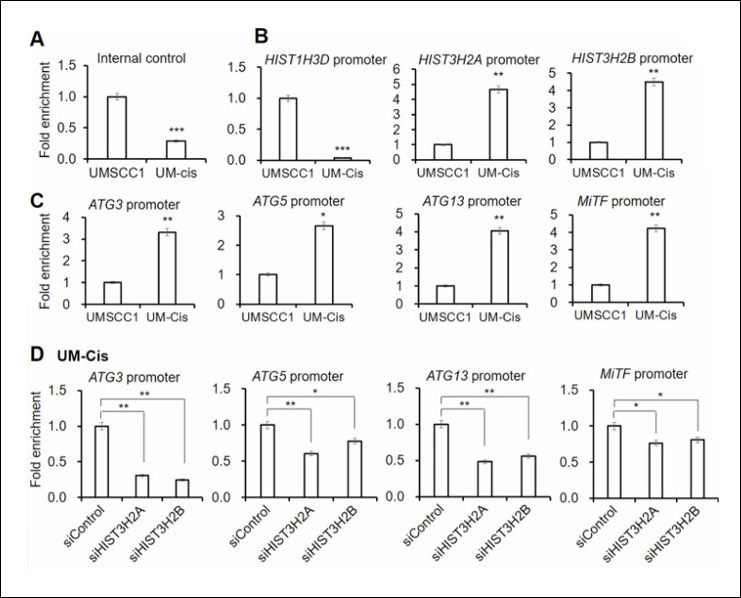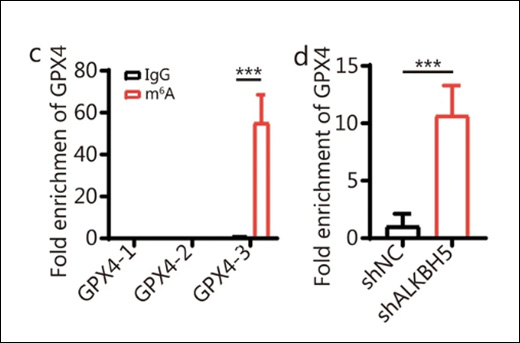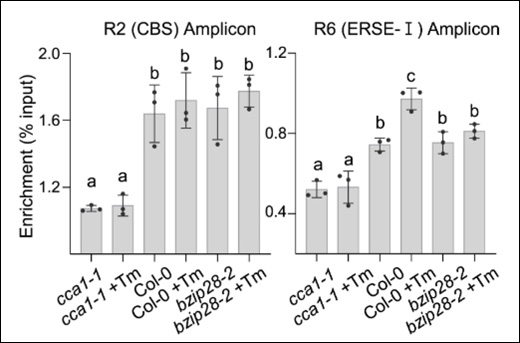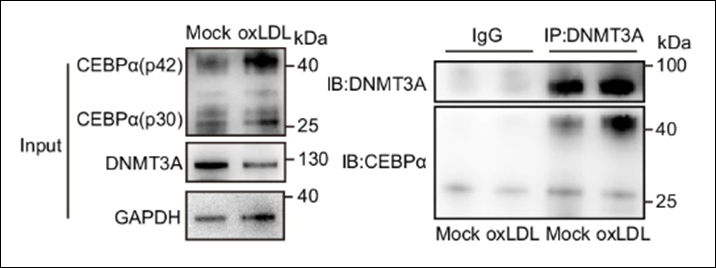Ramírez-Tejero JA et. al. (July 2020). Epigenetic Regulation of Verticillium dahliae Virulence: Does DNA Methylation Level Play A Role? Int J Mol Sci. 21(15)
This article investigates the role of epigenetic mechanisms in the virulence of Verticillium dahliae, the causative agent of Verticillium wilt in olive plants. The study reveals an inverse correlation between virulence and DNA methylation of specific genes, highlighting the potential involvement of epigenetics in controlling virulence traits, with implications for energy metabolism, membrane transport, host attachment, and pathogenicity.
Products Used: 5-Methylcytosine (5-mC) Monoclonal Antibody [33D3]
Tang Y et. al. (October 2023). ALKBH5-mediated m6A demethylation of HS3ST3B1-IT1 prevents osteoarthritis progression iScience. 26(10):107838.
In this study, researchers investigate the role of a downregulated long noncoding RNA, HS3ST3B1-IT1, in osteoarthritis (OA) and its potential therapeutic implications. The study demonstrates that HS3ST3B1-IT1 positively regulates chondrocyte viability, inhibits apoptosis, and enhances extracellular matrix protein production, ultimately ameliorating OA progression both in vitro and in vivo, with mechanistic insights into its regulation by ALKBH5-mediated m6A demethylation. These findings suggest that targeting the HS3ST3B1-IT1/HS3ST3B1 axis may hold promise as a therapeutic approach for treating OA.
Products Used: N6-methyladenosine (m6A) Polyclonal Antibody
Azhar M et. al. (September 2023). The arginine methyltransferase Prmt1 coordinates the germline arginine methylome essential for spermatogonial homeostasis and male fertility Nucleic Acids Res.
The article explores the role of Prmt1, an arginine methyltransferase, in germline development and male fertility. The study reveals that Prmt1 is crucial for spermatogonial establishment and maintenance, with its methylarginine-directed signaling influencing transcriptional homeostasis and alternative splicing patterns in mouse spermatogonia, providing valuable genetic and mechanistic insights into germline development in mammals.
Products Used: Histone H3R2 Dimethyl Asymmetric (H3R2me2a) Polyclonal Antibody
Lu-Culligan WJ et. al. (September 2023). Acetyl-methyllysine marks chromatin at active transcription start sites Nature.
The study uncovers a novel post-translational modification, Nε-acetyl-Nε-methyllysine (Kacme), which can simultaneously exist with lysine methylation and acetylation on histone H4. This modification is associated with active chromatin, increased transcriptional initiation, and is regulated by biological signals, shedding new light on the complexity of chromatin regulation and its potential significance in chromatin biology.
Products Used: EpiQuik Total Histone Extraction Kit
Jia H et. al. (September 2023). The Epigenetic Legacy of Maternal Protein Restriction: Renal Ptger1 DNA Methylation Changes in Hypertensive Rat Offspring Nutrients. 15(18)
This article investigates the role of epigenetic modifications in the development of hypertension in offspring exposed to maternal protein restriction during gestation. The study reveals a correlation between DNA hypermethylation of the Ptger1 gene and high mRNA expression in the kidneys of hypertensive rat offspring, with post-weaning diets further modifying this epigenetic variation, suggesting potential epigenetic biomarkers and therapeutic strategies for hypertension prevention.
Products Used: BisulFlash DNA Modification Kit
Bermúdez G et. al. (August 2023). Long Noncoding RNA TALAM1 Is a Transcriptional Target of the RUNX2 Transcription Factor in Lung Adenocarcinoma Curr Issues Mol Biol. 45(9):7075-7086.
The study explores the role of the transcription factor RUNX2 in lung cancer and identifies the long noncoding RNA TALAM1 as one of its genetic targets, with RUNX2 negatively regulating TALAM1 transcription. This study sheds light on the regulatory mechanisms involved in lung adenocarcinoma and highlights the potential significance of the RUNX2-TALAM1 axis in lung cancer development.
Products Used: ChromaFlash Chromatin Extraction Kit
Marzullo M et. al. (September 2023). Su(var)3-9 mediates age-dependent increase in H3K9 methylation on TDP-43 promoter triggering neurodegeneration Cell Death Discov. 9(1):357.
The article investigates the role of the Su(var)3-9 enzyme in age-related epigenetic modifications associated with neurodegeneration, particularly in amyotrophic lateral sclerosis (ALS). The study reveals that Su(var)3-9 leads to increased methylation of histone H3K9 in the TDP-43 gene promoter, affecting its expression and contributing to locomotor defects in aging organisms, highlighting a novel epigenetic mechanism potentially relevant to ALS pathogenesis.
Products Used: EpiQuik Tissue Chromatin Immunoprecipitation (ChIP) Kit
Hong H et. al. (September 2023). VIRMA promotes neuron apoptosis via inducing m6A methylation of STK10 in spinal cord injury animal models CNS Neurosci Ther.
This article explores the role of VIRMA in spinal cord injury (SCI) by inducing m6A methylation of STK10, leading to neuronal apoptosis. The study suggests that VIRMA negatively regulates STK10 expression, providing insights into the mechanisms underlying neuronal apoptosis in SCI, potentially opening new avenues for therapeutic interventions.
Products Used: EpiQuik m6A RNA Methylation Quantification Kit (Colorimetric)
Ma Y et. al. (September 2023). Disruption of CerS6-mediated sphingolipid metabolism by FTO deficiency aggravates ulcerative colitis Gut.
In this article, researchers investigate the role of the RNA demethylase FTO in ulcerative colitis (UC). The study shows that FTO deficiency leads to dysbiosis of gut microbiota, increased inflammation, and differentiation of Th17 cells, primarily through the dysregulation of sphingolipid metabolism via the downregulation of CerS6, highlighting the potential therapeutic implications for UC patients with lower FTO expression who may respond better to vedolizumab treatment.
Products Used: EpiQuik m6A RNA Methylation Quantification Kit (Colorimetric)
Geng Y et. al. (September 2023). FTO-targeted siRNA delivery by MSC-derived exosomes synergistically alleviates dopaminergic neuronal death in Parkinson's disease via m6A-dependent regulation of ATM mRNA J Transl Med. 21(1):652.
The study investigates a potential therapy for Parkinson's disease (PD) by using mesenchymal stem cell-derived exosomes (MSC-Exo) to deliver siRNA targeting the m6A demethylase FTO. The study demonstrates that this approach effectively reduces dopaminergic neuronal death in PD models by regulating ATM mRNA stability through m6A modification, offering a promising synergistic therapeutic strategy for PD treatment.
Products Used: EpiQuik m6A RNA Methylation Quantification Kit (Colorimetric)
Wang X et. al. (September 2023). METTL14-upregulated miR-6858 triggers cell apoptosis in keratinocytes of oral lichen planus through decreasing GSDMC Commun Biol. 6(1):976.
This study explores the mechanism behind cell apoptosis in oral lichen planus (OLP). The study reveals that METTL14-induced N6-adenosine methylation (m6A) leads to increased miR-6858 expression, which in turn promotes GSDMC mRNA degradation, contributing to keratinocyte apoptosis in OLP, providing insights into the molecular pathways involved in this chronic inflammatory disorder.
Products Used: EpiQuik m6A RNA Methylation Quantification Kit (Colorimetric)
Zhao S et. al. (September 2023). METTL3 Promotes the Differentiation of Goat Skeletal Muscle Satellite Cells by Regulating MEF2C mRNA Stability in a m6A-Dependent Manner Int J Mol Sci. 24(18)
The article uncovers the role of METTL3, an m6A methyltransferase, in the development of goat skeletal muscle. The study demonstrates that METTL3 enhances myogenic differentiation in skeletal muscle satellite cells by regulating the stability of MEF2C mRNA through m6A modification, shedding light on a post-transcriptional mechanism in goat muscle development.
Products Used: EpiQuik m6A RNA Methylation Quantification Kit (Colorimetric)
Shi K et. al. (September 2023). METTL3 exerts synergistic effects on m6A methylation and histone modification to regulate the function of VGF in lung adenocarcinoma Clin Epigenetics. 15(1):153.
The article investigates the interplay between different epigenetic modifications in lung adenocarcinoma (LUAD) with a focus on the gene VGF. The study demonstrates that METTL3, through both m6A modifications and histone modifications, regulates the expression of VGF in LUAD cells, highlighting the complex epigenetic mechanisms involved in cancer and their potential implications for precision treatment.
Products Used: EpiQuik CUT&RUN m6A RNA Enrichment (MeRIP) Kit




 Cart (0)
Cart (0)













